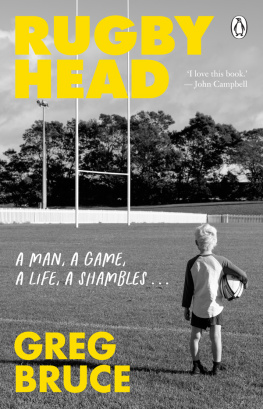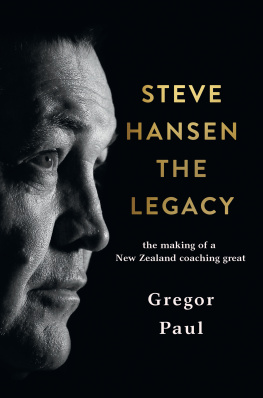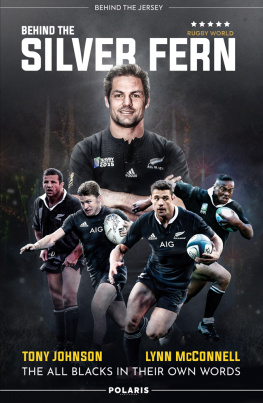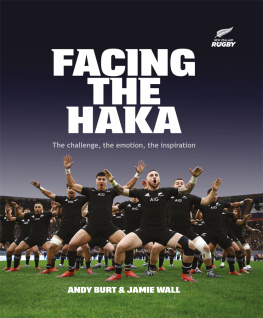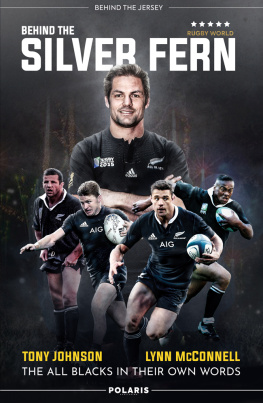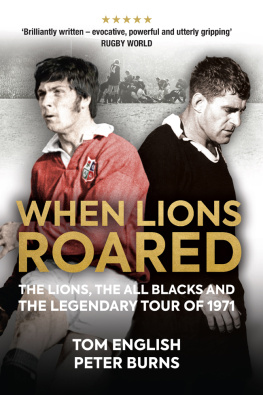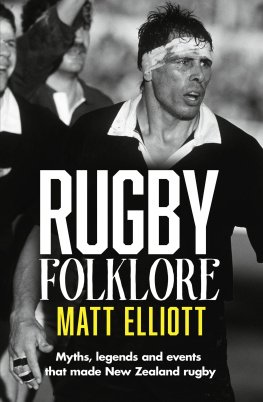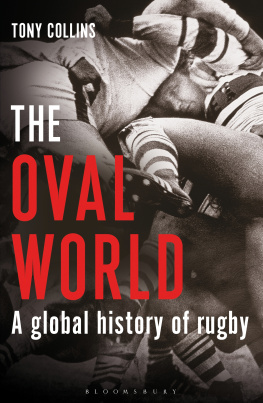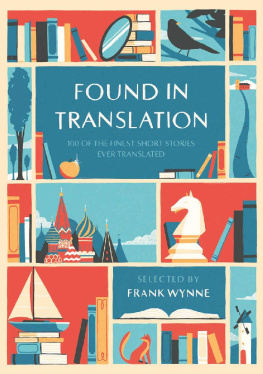Wynne Gray - Rugby: The Afterlife: Former All Blacks Tell Their Stories
Here you can read online Wynne Gray - Rugby: The Afterlife: Former All Blacks Tell Their Stories full text of the book (entire story) in english for free. Download pdf and epub, get meaning, cover and reviews about this ebook. year: 2018, publisher: Upstart Press, genre: Home and family. Description of the work, (preface) as well as reviews are available. Best literature library LitArk.com created for fans of good reading and offers a wide selection of genres:
Romance novel
Science fiction
Adventure
Detective
Science
History
Home and family
Prose
Art
Politics
Computer
Non-fiction
Religion
Business
Children
Humor
Choose a favorite category and find really read worthwhile books. Enjoy immersion in the world of imagination, feel the emotions of the characters or learn something new for yourself, make an fascinating discovery.

- Book:Rugby: The Afterlife: Former All Blacks Tell Their Stories
- Author:
- Publisher:Upstart Press
- Genre:
- Year:2018
- Rating:3 / 5
- Favourites:Add to favourites
- Your mark:
- 60
- 1
- 2
- 3
- 4
- 5
Rugby: The Afterlife: Former All Blacks Tell Their Stories: summary, description and annotation
We offer to read an annotation, description, summary or preface (depends on what the author of the book "Rugby: The Afterlife: Former All Blacks Tell Their Stories" wrote himself). If you haven't found the necessary information about the book — write in the comments, we will try to find it.
Rugby: The Afterlife: Former All Blacks Tell Their Stories — read online for free the complete book (whole text) full work
Below is the text of the book, divided by pages. System saving the place of the last page read, allows you to conveniently read the book "Rugby: The Afterlife: Former All Blacks Tell Their Stories" online for free, without having to search again every time where you left off. Put a bookmark, and you can go to the page where you finished reading at any time.
Font size:
Interval:
Bookmark:
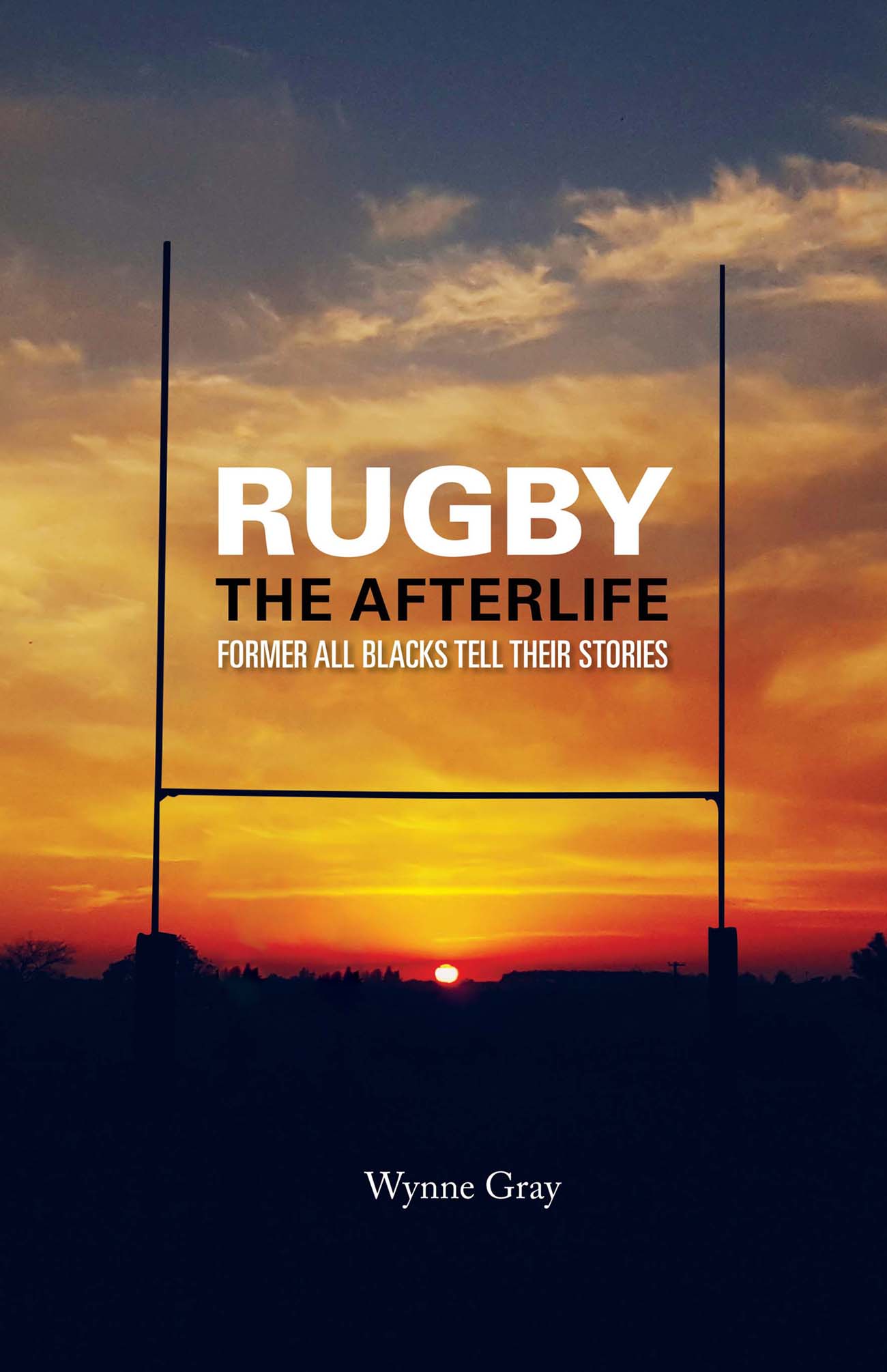
A catalogue record for this book is available from the National Library of New Zealand
ISBN
e: 978-1-988516-32-5
m: 978-1-988516-33-2
An Upstart Press Book
Published in 2018 by Upstart Press Ltd
Level 4, 15 Huron St, Takapuna 0622
Auckland, New Zealand
Text Wynne Gray 2018
The moral rights of the author have been asserted.
Design and format Upstart Press Ltd 2018
All rights reserved. No part of this publication may be reproduced or transmitted in any form or by any means, electronic or mechanical, including photocopying, recording, or any information storage and retrieval system, without permission in writing from the publisher.
Designed by CVD Limited ( www.cvdgraphics.nz )
Cover image: Getty
Contents
About the Writer
Wynne Gray began his journalism career on the Auckland Star and the 8 OClock before heading to travel and work in Europe and Australia. When he returned he became the senior rugby writer for the New Zealand Herald and attended more than 250 All Blacks tests and internationals around the globe, filing for the company newspapers and also online. He has written several books, been a guest panelist on Sky television, won a number of awards and is a life member of the New Zealand Sports Journalists Association.
Introduction
When the final whistle sounds and the payments cease, what plans do All Blacks have for their future?
How are they placed to deal with life outside the training fields, gyms, hotels and whiteboard sessions that have become their routine existence? What occupation do they turn to and what plans have they made for life after a professional rugby career?
Way back when, there was a clear definition between work and rugby. Great names in the game spent their time working in an office, at a trade or out on the farm mixed in with training then playing at the weekends. That distinction between work and play became blurred through the 1980s and 90s until, in the wake of Jonah Lomus stunning exploits at the 1995 World Cup and pressure from media barons, the International Rugby Board declared rugby professional.
Some players just missed that pay dirt, others straddled the crossover years, while the rest have never known any different and filled in full-time sportsman on their tax returns as rugby picked its way through two decades of professionalism.
For all of them, there was a finishing line, a final test appearance. Some made that choice; others had it made for them. Some All Blacks planned for life after rugby; others were more laissez-faire about the next chapter of their lives.
How did they handle that transition? Did they wait for guidance, have a lightbulb moment, take on some serious study or retraining or did they have the security of going back into a family business? How did a life in rugby protect or prepare them for experiences after the game, and how and why did they make the choices they did?
Rugby the Afterlife explores how 23 All Blacks coped with that transition and came out the other side. They represent a range of players, some legends of the game, some who racked up fewer tests, but all provide a candid portrait of life after rugby.
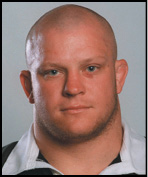
Mark Allen
Bull Allen represented New Zealand in 27 matches as prop between 1993 and 1997, including in eight tests, and scored one test try. He led the Hurricanes in the Super 12 in 1996 and played 110 games for Taranaki. He was also captain of the short-lived Central Vikings in 1997.
T he end came in a scrum against the Brumbies in 98 in a match I probably should never have started. My back was buggered.
Id been fortunate to play in both the amateur and professional eras at my peak, and it looked like I was going to be a regular in the test team. Everything was lining up, but my marriage was just about stuffed because I was never home. Rugby took me away all the time and in those early days of professional rugby as captain of the Hurricanes, even if I wasnt playing I was promoting the team. I enjoyed a good public profile but was letting myself down on the home front.
People were asking why I got so much publicity when I wasnt even a regular test player. Laurie Mains preferred to pick Richard Loe because he was seen as a tighter player than me, while I preferred to run with the ball. It was a very interesting time. I had a good crack and was a reserve in about 30 tests. I played in 27 All Blacks games and eight tests, although I only started in one of those tests.
When I finished, I felt like I could have played a lot more games for the All Blacks and I felt I had failed. Blessed with success, but cursed with ambition.
I felt like I never quite achieved what I could have. I thought I could play more tests, but the question mark was always around my scrummaging. I was very visible doing other things around the field, but there was a perception I couldnt scrum. I had a few challenges as I had started as a prop late in my rugby career at 19, although I felt by the time I finished I had sorted it out. Its all about timing. Someone like Duane Monkley springs to mind; he could have been a wonderful All Black, but he didnt get the nod in his era.
At the time, the All Blacks had captain Sean Fitzpatrick, Craig Dowd and Olo Brown as a collective and they were the best front row in the world. It was as simple as that and it didnt make sense to break them up. I remember playing in the trials and getting to go alongside Fitzy and he was such a terrific scrummager.
There I was with my life at a crossroads with three young kids at that stage, a wife whod had enough, and a decision had to be made. I thought if I continue playing my back was giving me grief did I want to be crippled by the time I got to 50?
Ive reached that age now and feel Im in great nick. Ive looked after myself so looking back, I made the right decision. I could have played a few more years if everything had hung together and played more tests, but at what expense? I have no regrets. I have five great kids and three grandkids, and a strong marriage. Were all still together and doing well.
Id trained as an auto electrician and loved working for my father in Taranaki, but there wasnt really room in the business for me as well, so after rugby I started doing a lot of promotional stuff for companies, some commentating, TV work and presenting. We were living just out of Stratford and my wife Geralyn pointed out that while Id given up rugby, I was still away doing promotional work, usually in Auckland and Wellington, and if that was going to continue, we needed to move.
Originally, we were going to shift into New Plymouth but decided if we were going to make a change we should go somewhere different, so we moved to the Bay of Plenty, to Omokoroa on the edge of Tauranga where Geralyns parents had a property. I was picking up sufficient small jobs to keep paying the bills, not enough to ever get rich, but I was happy to spend more time with the kids and think about some ideas.
I had a bit of money from professional rugby and Geralyn had studied for a law degree, then went back to run the family sheep and beef farm when her father got sick. She was keen to continue farming, but that wasnt me, so we went into kiwifruit.
We lost heaps of money. We made a couple of bum calls and lost about a million bucks. At the same time, we were building a house in Bethlehem in Tauranga that was going to cost us $400,000 so I needed an income. The one good investment we had was in Omokoroa with Geralyns family.
Font size:
Interval:
Bookmark:
Similar books «Rugby: The Afterlife: Former All Blacks Tell Their Stories»
Look at similar books to Rugby: The Afterlife: Former All Blacks Tell Their Stories. We have selected literature similar in name and meaning in the hope of providing readers with more options to find new, interesting, not yet read works.
Discussion, reviews of the book Rugby: The Afterlife: Former All Blacks Tell Their Stories and just readers' own opinions. Leave your comments, write what you think about the work, its meaning or the main characters. Specify what exactly you liked and what you didn't like, and why you think so.

